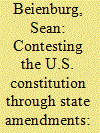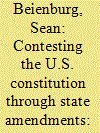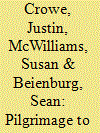| Srl | Item |
| 1 |
ID:
130959


|
|
|
|
|
| Summary/Abstract |
IN MARCH OF 2013, REPUBLICAN LEGISLATORS in North Dakota agreed to challenge Roe v. Wade by forwarding a "personhood" amendment to voters that will appear on the 2014 ballot. Such an amendment would change the state's legal definition of personhood to include unborn fetuses-a move that backers have explicitly discussed as part of a challenge to a Supreme Court decision they view as having been wrongly decided.1 The Court may pronounce itself the final arbiter of the Constitution, but Americans outside of Washington, DC do not necessarily agree.2
Such efforts by state actors to take the Constitution away from the courts mirror a recent shift in political-legal scholarship, in which court-centered accounts of constitutional interpretation and construction have been rightly condemned.3 Scholars have turned instead toward a renewed emphasis on the political contestation of non-judicial actors in enforcing the Constitution.4
|
|
|
|
|
|
|
|
|
|
|
|
|
|
|
|
| 2 |
ID:
130960


|
|
|
|
|
| Summary/Abstract |
IN MARCH OF 2013, REPUBLICAN LEGISLATORS in North Dakota agreed to challenge Roe v. Wade by forwarding a "personhood" amendment to voters that will appear on the 2014 ballot. Such an amendment would change the state's legal definition of personhood to include unborn fetuses-a move that backers have explicitly discussed as part of a challenge to a Supreme Court decision they view as having been wrongly decided.1 The Court may pronounce itself the final arbiter of the Constitution, but Americans outside of Washington, DC do not necessarily agree.2
Such efforts by state actors to take the Constitution away from the courts mirror a recent shift in political-legal scholarship, in which court-centered accounts of constitutional interpretation and construction have been rightly condemned.3 Scholars have turned instead toward a renewed emphasis on the political contestation of non-judicial actors in enforcing the Constitution
|
|
|
|
|
|
|
|
|
|
|
|
|
|
|
|
| 3 |
ID:
096397


|
|
|
|
|
| Publication |
2010.
|
| Summary/Abstract |
As part of a course considering "American Democracy in Theory and Practice," we took 36 students to Rick Warren's Saddleback Church in Lake Forest, California. During that visit, students observed a community that seeks self-sufficiency and yet proves to be simultaneously responsive to and reflective of American democracy more broadly. Specifically, in a few short hours, they were able to see the virtues of civic association, the difficulty of respecting individualism in large-scale polities, the influence of regional identity, and the two-way interaction between politics and culture-all themes that featured prominently in our course. We offer this reflection to suggest the pedagogical benefits of showing the tensions of American politics in action and to encourage colleagues to consider integrating similar ventures into their own courses.
|
|
|
|
|
|
|
|
|
|
|
|
|
|
|
|